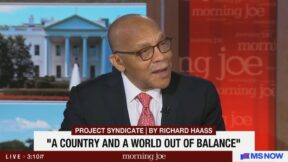Facts In Exile: Washington Post’s Sen. Marco Rubio ‘Exposé’ Is Identity Politics At Its Worst
His Politico column was followed by an appearance on Hot Air‘s Ed Morrissey where he hits the Post harder than in his column, and gets to the core of why the piece was written: “the Washington Post piece implies that my parents are not exiles, and I find that offensive and absurd.” He also appeared on Fox News’ Studio B yesterday, where he admitted he had mixed up a few dates because “I don’t walk around with my parents’ passports in my pocket, and considered the idea that people who left Cuba because of the situation under Batista were somehow not exiles “outrageous… there’s not a single credible voice in the Cuban exile community that would agree with that.” That appearance via Fox News below:
Being a Latin American Republican—particularly a Cuban-American Republican—is a dangerous political game to play. Most non-Latin Americans in this country haven’t had the time to study the history of this synthetic identity, and as such assume they are all one people with one history. Sharing a language doesn’t seem to help this misconception. It is difficult for a voter who can’t tell the difference between a Mexican-American and a Cuban-American (not as a product of any bigotry, but simply because it is documented fact there are areas of the United States where the Latino populations are so low it is feasible to have never met a Latino) to understand how the latter could be a group made up in majority of college-educated, affluent white people who on the whole seem to have a serious problem with illegal immigration. As far as identity politics go, the pervasive misunderstanding of Latin Americans as a monolithic political block also leaves heads scratching when people like Sen. Rubio are called “not real Americans” with impunity by leftist mouthpieces or become the victims of blackmail plots by Univisión.
As the representative of his ethnic group, Sen. Rubio has done a remarkable job of explaining the difference through subtleties. In his victory speech in November 2010, he referred to himself exclusively as an “exile,” not an “immigrant.” His allies in the media help, particularly people like Sean Hannity, by likening his family’s story more to the tales of white immigrants coming through Ellis Island, taking the legal route to a new life, but highlighting a very important difference: money didn’t lead the Rubios into America, politics did. For many in the Cuban-American community, myself included, it is refreshing to see such a prominent voice in politics reclaim the title of exile as something to be proud and not ashamed of, as an identity unique to the migration experience and distinct from that of the immigrant seeking a brighter economic future or a faster way to reach a certain socioeconomic status that would otherwise be near impossible to achieve.
RELATED: Coverage Of ‘Tequila Party’ Political Movement Highlight’s The Media’s Latino Problem
It does not matter that Rubio’s parents had the foresight and means to escape communism two decades before mine did; three decades before the Mariel boatlift; four decades before Castro permitted Cuban “balseros” to sail to their doom on makeshift rafts, boats made out of old cars, and inner tubes; five decades before the arrival of Elián González. The Rubios are exiles all the same, and their son is correct to assume that no credible voice in his community would disown him.
Of course, the entire point of the report is to chip away at that essential fact, to deny Senator Rubio the proud status of exile. Its intent is to paint a picture of his parents as greedy capitalists whose son exploited the timeliness of their departure to the states at the expense of those with tangible political prisoners. In doing so, it attempts to shame Cuban exiles no matter when they landed on the island, and, by proxy, shame anyone who refuses to live under the yoke of tyranny and is willing to give up their nation for their children’s freedom.
RELATED: Media Ignores Ed Schultz’s De-Americanization Of Cuban-Americans In Sen. Rubio Rant
No amount of historical correction or political dissecting of the Washington Post‘s smear will quite reach the emotional heart of the matter quite as well as one seemingly mundane anecdote in Sen. Rubio’s narration of the Cuban-American experience, however– a technological experience he shared with his parents that will sound all too familiar to every other Cuban-American whose first instinct was to find their homeland when they heard Google had put the world at their fingertips in a very literal way:
“A few years ago, using Google Earth, I attempted to take my parents back to Cuba. We found the rooftop of the house where my father was born. What I wouldn’t give to visit these places where my story really began, before I was born.
One day, when Cuba is free, I will. But I wish I could have done it with my parents.”
That is the core of exile, the missing ingredient immigrants will never understand and Roig-Franzia refuses to acknowledge exists, and no amount of fabricated scandal will deprive Sen. Rubio of the mark of that experience.
Pages: 1 2
This is an opinion piece. The views expressed in this article are those of just the author.





Comments
↓ Scroll down for comments ↓